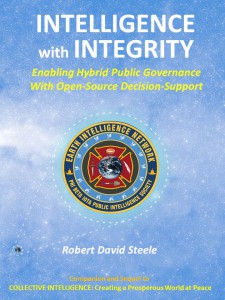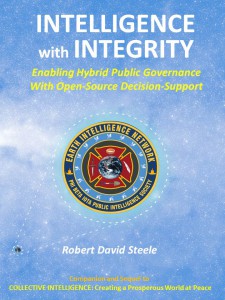Bibliography
PBI: Phi Beta Iota the Public Intelligence Blog
Continue reading “INTELLIGENCE with INTEGRITY Bibliography (Living — as of Chapter 4)”
Bibliography
PBI: Phi Beta Iota the Public Intelligence Blog
Continue reading “INTELLIGENCE with INTEGRITY Bibliography (Living — as of Chapter 4)”

Utilizar el Traductor de Google en la parte superior de la columna central
Utilisez Google Translate au haut de la colonne du milieu
Google’ın Orta Sütun Top of Çevir kullanın
Используйте Google Translate в верхней части среднего столбца
Sử dụng Google Translate Đầu Cột Trung
उपयोग Google मध्य स्तंभ के शीर्ष पर अनुवाद
在中间一列的顶部,使用谷歌翻译
استخدام جوجل ترجمة في أعلى العمود الأوسط
06 CH 4.1 Strategy 47-56
Book Master Page with All Chapters
DRAFT 1 OF 15
Chapter 4: Four Domains for Applied Intelligence
Funded by Pierre Thibault (ME)
A. Integrity Is a Grand Strategy 47
B. Grand Strategy 49
C. Strategy 49
D. Threats, Goals, Priorities 50
E. Whole of Government Management 51
F. Affordable Coherent Acquisition 52
G. Just Enough Just in Time Operations 53
H. Strategic Education 53
I. Strategic Intelligence 54
J. Strategic Research 54
Dysfunctionalism is both a personality disorder and an institutional disorder. Public administration can refer to the pseudi-discipline of public administation, and to the functions of governance for which the discipline serves as a clerk, offering no normative or pro-functionality frame of reference.
The general definition of dysfunctional is (1) failing to perform the function that is normally expected, (2) unable to function emotionally as a social unit, (3) not functioning normally.
There are three general types of dysfunction in public administration:
01 During the wrong thing wrong.
02 Doing the wrong thing right.
03 Doing the right thing wrong.
Doc (1): 2013 Public Governance Abstract
The 21st Century Intelligence link is persistent within the What Price Integrity Box under Robert Steele's Head Shot. Public Intelligence 3.1
At the very highest level, public administration deals, in theory, with optimizing ends (what do we all want and need) with ways (how can we best achieve our ends) and means (how do we pay for the capabilities and behaviors that lead the the achievement of our ends).
Continue reading “Search: what is dysfunctionalism in public administration”

Utilizar el Traductor de Google en la parte superior de la columna central
Utilisez Google Translate au haut de la colonne du milieu
Google’ın Orta Sütun Top of Çevir kullanın
Используйте Google Translate в верхней части среднего столбца
Sử dụng Google Translate Đầu Cột Trung
उपयोग Google मध्य स्तंभ के शीर्ष पर अनुवाद
在中间一列的顶部,使用谷歌翻译
05 CH 3.2 The Human Factor 35-46
Book Master Page with All Chapters
DRAFT 2 of 15
Chapter 3: The Human Factor
Funded by Richard Wright (NM)
A. Man as a Psycho-Social Node 35
B. Forms of Human Organization 37
C. Domains of Human Organization 39
D. Predicting Revolution 40
E. Role of Legitimacy & Trust 41
F. Power of the Powerless 41
G. Culture, History, & Language Matter 42
H. Man as Wild Card 43
This is the most important chapter in the book. We will not move on until everyone in the class gets it.
Continue reading “INTELLIGENCE with INTEGRITY Chapter 3: The Human Factor”

Am quite happy to help you as very few really have a mastery of this emerging pillar of 21st Century intelligence. I am posting this answer at Phi Beta Iota to help others, and will gladly respond to any further questions you might have, respecting your individual privacy.
01) In identifying and discussing the mechanisms of contemporary terrorism (organisational system, communication, etc.) and establishing a scorecard for how each of the disciplines does against them, you will be severely handicapped because those who spend great sums on secret sources and methods will lie to themselves, to their policy masters, and to the public, in order to protect those budgets. In my experience, most terrorist events are false flag events organized by the Mossad, the CIA, the FBI, or the local national intelligence or security force, generally under the guise of a drill that has unwitting “patsies” — and of course labeling legitimate opposition and insurgent groups as “terrorists.”
The other problem is of course blatant dishonesty, where everyone in opposition to their government — including now US citizens — can be labeled a terrorist and killed without trial. We even have Senators who should know better talking about “so-called Americans” as if their citizenship were some how invalidated by opinion. At the same time, we have governments that make decisions based on bribes from the recipients of taxpayer money, rather than on the needs of the taxpayer, and secret intelligence really does not matter, except as a crutch to justify spending money in criminally insane ways.
Continue reading “2013 Robert Steele Answers to MA Student in UK — OSINT and Terrorism 2.0”

Utilizar el Traductor de Google en la parte superior de la columna central
Utilisez Google Translate au haut de la colonne du milieu
Google’ın Orta Sütun Top of Çevir kullanın
Используйте Google Translate в верхней части среднего столбца
Sử dụng Google Translate Đầu Cột Trung
उपयोग Google मध्य स्तंभ के शीर्ष पर अनुवाद
在中间一列的顶部,使用谷歌翻译
04 CH 2.4 Information Pathologies 21-34
Book Master Page with All Chapters
DRAFT 4 OF 15
Chapter 2:
The InfoSphere & Its Enemies
Funded by John Dodson (TX) & Peter Thibault (ME)
A. Cybernetics 101 22
B. Truth or Not Truth 22
C. The Evolution of Information Needs 23
D. Eight Isolated Information Communities 24
E. Information Cube 25
F. Information Fragmentation 26
G. Information Pathologies 27
H. Sourcing – Art & Science 29
I. Collective Intelligence 29
J. The Human Factor – Always 30
K. Information Challenges 30
Continue reading “INTELLIGENCE with INTEGRITY Chapter 2: The InfoSphere & Its Enemies”

Utilizar el Traductor de Google en la parte superior de la columna central
Utilisez Google Translate au haut de la colonne du milieu
Google'ın Orta Sütun Top of Çevir kullanın
Используйте Google Translate в верхней части среднего столбца
Sử dụng Google Translate Đầu Cột Trung
उपयोग Google मध्य स्तंभ के शीर्ष पर अनुवाद
在中间一列的顶部,使用谷歌翻译
استخدام جوجل ترجمة في أعلى العمود الأوسط
03 CH 1.6 Public Governance 3-20
Book Master Page with All Chapters
DRAFT 5 OF 15 Chapter 1:
Public Governance & Public Intelligence
This chapter funded by Michael Kearns of Colorado.
A. Why This Textbook?. 4
B. What Is Public Governance?. 5
C. Hybrid Public Governance Brings Eight Tribes Together 6
D. Making A Difference – Four Domains Of Governance. 7
E. What Is Intelligence? Why Does It Matter More Now?. 8
F. Six Challenges Identified In 1990 – Still Not Met 9
G. Three Eras Of Intelligence. 11
H. Intelligence As A Process. 12
I. Intelligence As A Product 14
J. Intelligence As A Service. 15
K. The World Of Intelligence. 15
L. Creating A Smart Nation. 16
N. Theory Of Intelligence. 17
Continue reading “Intelligence with Integrity Chapter 1: Public Governance & Public Intelligence”